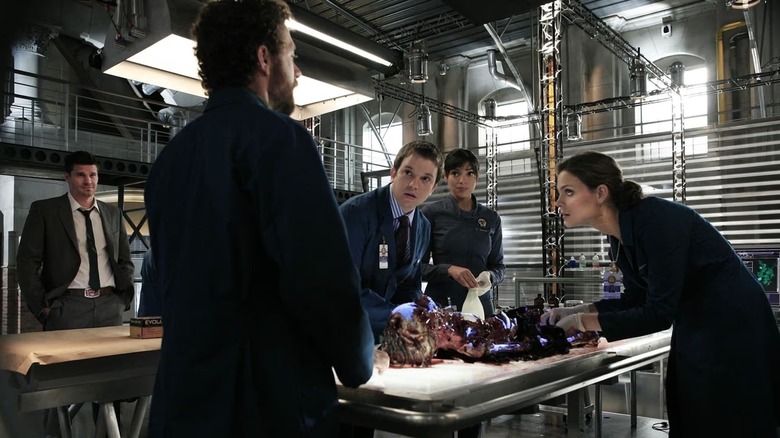“Bones,” as the title of the show implies, often centers on, well, bones. The team of Brennan and Booth, played by Emily Deschanel and David Boreanaz in every episode of the series, investigate various, bizarre murders, making up the procedural format that carried this show for well over 200 episodes across 12 seasons. It’s easy enough to write a unique dead body, but it’s a little harder to create that dead body on a network TV budget. Sometimes, that meant using old-school practical effects.
In “Bones: The Official Companion,” the creatives behind the show discussed the season 2 episode “The Glowing Bones in the Old Stone House.” That title, aside from serving a practical purpose for the creators, let viewers know that Brennan and Both were going to find some glowing bones, which they indeed did. But how did the team make those bones glow for viewers? Producer Jan DeWitt explained precisely how they made it happen:
“‘Bones’ is a very quirky show. You never know what’s going to come at you. You have a cabin way out in the woods where we find a glowing body. Well, how does the body glow? Should we put the glow inside the bone or should we paint it on and use a black light or should we just electrify it somehow? It took about a week for us to figure all that out. We did paint it on and use black lights. And it looked great.”
The episode in question sees Brennan and Bones called by Homeland Security to investigate the scene at an old stone house where some glowing bones have been found, fearing the remains might be radioactive (though they ultimately prove not to be). The team later examines the bones and discovers the identity of the victim (an up and coming chef), but that offers no explanation regarding the glow. Ultimately, what we come to discover is that she cut herself making sushi. Bioluminescent bacteria was then introduced to her bloodstream and settled on her bones.
Bones went low tech to get results
This is just one of many examples of the “Bones” team pulling something off with limited resources, limited time, or both. The episode “Bodies in the Book” forced them to have to craft a convincing-looking dead body that matched the actor playing the role in very little time. Stuff like this had to be done on time and on budget. With more than 20 episodes per season in most cases, Fox couldn’t mess around and delay things or allow costs to balloon. So, paint and black lights it is.
The show often had to resort to leaning on the mystery of the episode, like trying to figure out why bones are glowing, because creator Hart Hanson didn’t want to put the main characters in true peril too often. But how does one make a show interesting without fear that the protagonists are going to die or truly be harmed? A mystery is one very good way to do that. The other challenge is making that mystery convincing. If those bones didn’t glow convincingly on TV, this might have fallen apart.
Hanson and the team generally managed to make it all work, even if it was chaotic behind the scenes at times. They only had budgetary issues from time to time, such as with the bottle episode “The Man in the Fallout Shelter.” Episodes like “The Glowing Bones in the Old Stone House” demonstrate how the show was able to pull it together week-to-week. It wasn’t CGI. It wasn’t fancy tech. It was low-tech ingenuity.
“Bones” is currently streaming on Hulu and Peacock.
